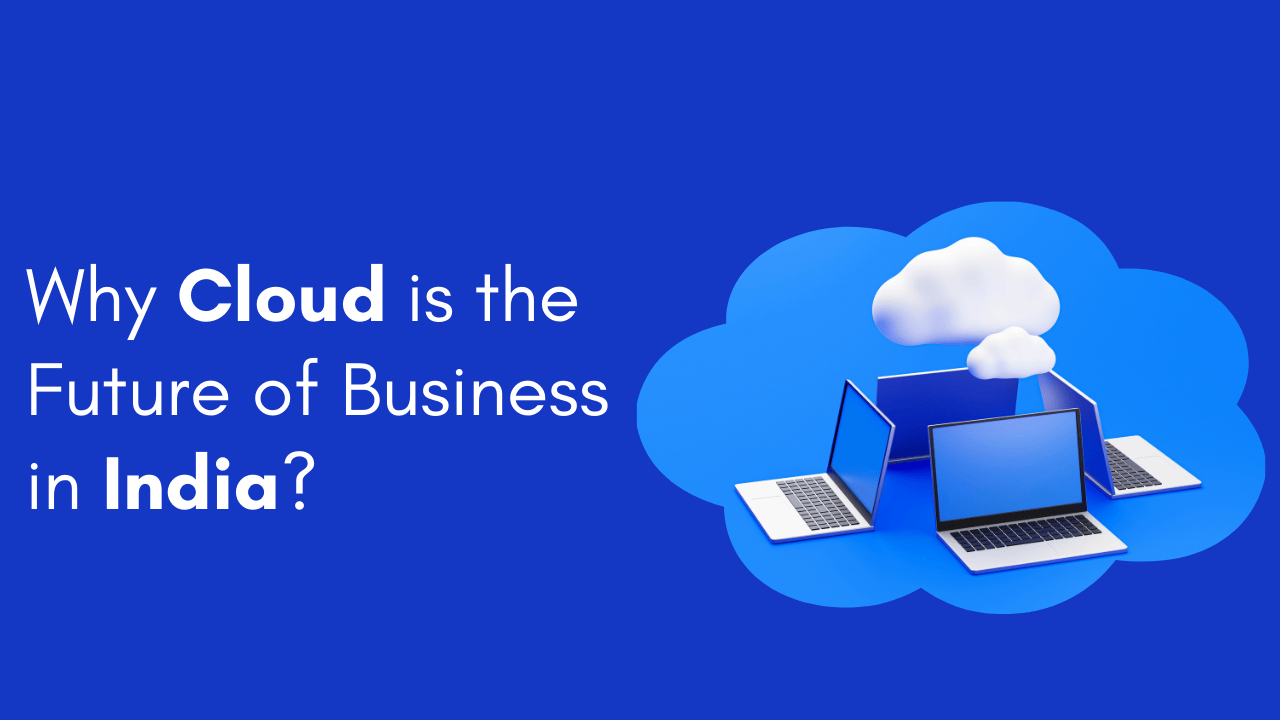Cloud computing is reshaping the way businesses operate, innovate, and scale. In India, the future of cloud is not just bright—it is transformative. What began as a cautious exploration a decade ago has now become a national movement, with enterprises, MSMEs, and startups embracing the cloud as the backbone of their digital-first strategies.
Industry reports suggest that India’s cloud market will grow at a compound annual growth rate (CAGR) of 23%, expected to surpass USD 17.8 billion by 2027. This surge is fueled by government initiatives like Digital India, the rise of AI and data-driven decision-making, and enterprises’ need for scalability, compliance, and security.
In this blog, we’ll explore the factors driving cloud adoption in India, the industries leading the charge, and what the future of cloud looks like for businesses of all sizes.
Why Cloud is the Future of Business in India
1. Cost Efficiency and Scalability
Traditional IT infrastructure demanded huge upfront costs for servers, networking, and maintenance. Cloud platforms like Microsoft Azure, AWS, and Google Cloud have flipped the model with pay-as-you-go pricing.
- MSMEs can adopt enterprise-grade solutions without breaking the bank.
- Large enterprises can scale infrastructure up or down instantly based on business needs.
This scalability ensures agility—an absolute must in today’s volatile market.
2. Government Push and Regulatory Compliance
The Indian government’s focus on digital transformation has been a major driver of cloud adoption. Programs like Digital India, Aadhaar, ONDC, and UPI require massive, secure, and scalable digital infrastructure.
Cloud providers have responded by establishing data centers in India (Mumbai, Pune, Hyderabad, Chennai), ensuring compliance with data sovereignty laws and reducing latency for end-users.
3. Rise of AI, Analytics, and IoT
The future of AI in India is inseparable from the cloud. With massive datasets generated from IoT devices, retail transactions, and digital payments, businesses need the power of the cloud to process, analyze, and draw insights in real-time.
- Power BI and Azure Synapse enable advanced analytics.
- AI-driven ERP solutions like Microsoft Dynamics 365 leverage cloud to automate processes and enhance decision-making.
The synergy between AI and cloud computing is unlocking new levels of innovation for Indian enterprises.
4. Remote Work and Hybrid Models
The pandemic accelerated cloud adoption in India by at least 3–5 years. Companies realized that cloud-based tools like Microsoft 365, Teams, and Zoom are critical for maintaining productivity in remote and hybrid environments.
Now, even as offices reopen, businesses are retaining cloud-based collaboration and HR platforms to ensure flexibility and employee satisfaction.
5. Competitive Edge in Fast-Moving Markets
Cloud adoption is no longer about cost savings—it’s about gaining a competitive edge. With faster deployment cycles, quicker product launches, and enhanced customer experiences, businesses using cloud can outpace competitors in industries like:
- Retail and E-commerce (real-time inventory and personalization)
- BFSI (fraud detection, digital payments)
- Healthcare (AI-powered diagnostics, patient portals)
Key Industries Driving Cloud Adoption in India
Manufacturing
Manufacturers are leveraging cloud ERP systems to gain end-to-end supply chain visibility, optimize production schedules, and ensure compliance with regulations like GST. Industry 4.0 technologies—like IoT-enabled smart factories—are powered by cloud-based analytics.
Banking, Financial Services, and Insurance (BFSI)
With UPI surpassing Visa in real-time transactions, the BFSI sector has turned to cloud platforms for secure payment processing, fraud detection, and personalized customer services. Regulatory bodies are also encouraging banks to adopt secure cloud frameworks.
Healthcare
Telemedicine, cloud-based patient record systems, and AI diagnostics are revolutionizing healthcare delivery in India. Hospitals are using cloud for faster, safer data exchange while ensuring compliance with patient data regulations.
Retail & E-commerce
The retail boom in India depends on cloud to enable omni-channel experiences, digital payments, and AI-driven customer personalization. Leading e-commerce players are scaling operations using multi-cloud strategies to handle peak demand.
The Future of Cloud in India: What Lies Ahead
1. Industry-Specific Cloud Platforms
The future will see the rise of tailored cloud solutions—like Cloud for Manufacturing, Cloud for Healthcare, and Cloud for BFSI—that address unique industry compliance and operational needs.
2. AI-Powered Cloud Services
AI won’t just run on the cloud—it will enhance the cloud itself. Expect predictive resource scaling, automated workflows, and real-time anomaly detection to become mainstream.
3. Hybrid and Multi-Cloud Strategies
Enterprises are increasingly adopting multi-cloud environments, using a mix of Azure, AWS, and private cloud to balance cost, performance, and security.
4. Edge Computing Expansion
To support IoT-heavy industries like manufacturing, telecom, and logistics, edge computing will bring data processing closer to the source, reducing latency and enhancing real-time decisions.
5. Enhanced Cybersecurity and Zero-Trust Models
With cyberattacks on the rise, businesses will adopt cloud-native security frameworks and zero-trust models, ensuring every access point is continuously verified.
Challenges Ahead
While the future is promising, Indian businesses must overcome challenges:
- Skill Gaps – Shortage of cloud architects and data engineers.
- Legacy Systems – Migrating from on-premise systems to cloud can be complex.
- Cost Optimization – Without proper governance, cloud costs can spiral.
- Data Privacy Concerns – Businesses must align with India’s evolving data protection laws.
Why Businesses Must Act Now
The future of cloud in India is not about if but how fast. Companies that delay adoption risk being left behind:
- Higher costs from maintaining outdated infrastructure.
- Slower growth due to fragmented, siloed data.
- Losing customers to digital-first competitors.
On the other hand, early adopters gain agility, innovation, and resilience—qualities that will define winners in India’s digital economy.
How Vatsin Enables Cloud Transformation
At Vatsin Technology, we help businesses embrace the cloud with confidence. As a Microsoft Solution Partner, our expertise spans:
- Microsoft Azure for scalable cloud infrastructure.
- Dynamics 365 Business Central for cloud ERP.
- Power BI for data analytics and visualization.
From strategy and migration to implementation and support, we enable businesses to adopt cloud solutions that are secure, scalable, and future-ready.
Conclusion
The future of cloud in India is accelerating faster than ever before. With government support, enterprise demand, and a thriving digital ecosystem, cloud computing is set to redefine how businesses innovate and grow.
The question for Indian enterprises is no longer “Should we adopt cloud?” but “How quickly can we move, scale, and lead?”
Those who embrace cloud-first strategies today will be the leaders shaping India’s digital future.







